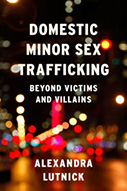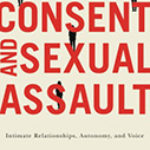Domestic Minor Sex Trafficking: Beyond Victims and Villains

Author: Alexandra Lutnick
Publisher: New York: Columbia University Press, 2016. 200p.
Reviewer: Melanie Clark Mogavero | September 2016
Sex trafficking is a topic veiled with stereotypes and misconceptions. In Domestic Minor Sex Trafficking, Alexandra Lutnick challenges these stereotypes and misconceptions by explaining the various challenges faced by minors who trade sex, and the collateral consequences of the state and government policies designed to combat sex trafficking. Lutnick collected data from case managers who work directly with minors who trade sex from three non-profit agencies located in New York, San Francisco, and Chicago.
In the first three chapters, Lutnick focuses on combating the stereotypes of those involved in domestic minor sex trafficking (DMST). Specifically, she describes the heterogeneity among those who trade sex (Lutnick avoids the use of the term “victim”) and those who assist them (sometimes referred to as “pimps”). Lutnick strongly emphasizes the various social problems that lead minors to become involved in trading sex. Minors who enter the sex trade are often runaways who escaped abuse and neglect and end up homeless. Such vulnerable youth can be willingly lured into the sex trade without overt force (unlike the common misconception) in order to meet their basic survival needs.
Chapters 4 and 5 highlight the challenges faced by the micro and macro social systems in place to assist those involved in DMST. Minors who trade sex require access to basic needs such as food, clothing, housing, medical care (including reproductive health and substance abuse treatment). In order to exit the sex trade, they often require assistance with obtaining education and employment. Minors experience many difficulties accessing such needs, including program eligibility, lack of community resources, and the youths’ apprehension about trusting service providers.
The social service programs in place to assist minors often include policies that prevent or deter them from accessing those services (i.e., requiring parental consent). In addition, macro systems such as the child welfare system and juvenile justice system often have competing priorities with different philosophical values. Current policies make coordination between the systems and service providers difficult if not impossible.
The final three chapters highlight the problems with the criminalization of the sex trade (i.e., prostitution) and the collateral consequences of policies designed to combat DMST. For example, minors who trade sex face being charged with sex trafficking for simply supporting or assisting their sex-trading peers. A criminal record of a sex offense results in lifelong barriers that reduce one’s ability to obtain meaningful employment and stable housing. Therefore, criminalization increases the likelihood the minors will continue working in the sex trade into adulthood.
Lutnick details how current federal, state, and local polices that address DMST essentially make the problem worse. She instead promotes strength-based responses to address DMST and its underlying causes, which include poverty and inequalities in education. Minors often enter the sex trade due to the limited options available to them as a result of abuse and neglect. The author makes a compelling case for reforming current sex trafficking policies, decriminalizing the sex trade, and changing the current social responses to DMST.
Lutnick provides a somewhat limited view of DMST by presenting data from only three sites, all in the northern part of the United States. For example, cities closer to the Mexican boarder may reveal different characteristics, needs, and barriers for undocumented immigrant youths who trade sex. Although limited to the three geographical areas, Domestic Minor Sex Trafficking is heavily cited with scholarly research and quotes from experts in the field. Readers interested in the sex trade and sex trafficking issues will find this book a valuable resource.
Melanie Clark Mogavero, Ph.D., Assistant Professor of Criminal Justice, Georgian Court University


